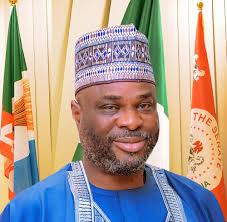The Senate Committee on Local Content, under the leadership of Senator Joel-Onowakpo Thomas, has thrown its weight behind President Bola Ahmed Tinubu’s Renewed Hope Agenda, promising full support for job creation, workers’ welfare, and Nigeria’s industrial revival.
Speaking during a high-level meeting with the Nigerian Labour Congress (NLC) in Abuja, Senator Thomas reaffirmed the Committee’s commitment to enforcing local content laws that protect Nigerian jobs, expand indigenous participation, and curb capital flight.
According to him, Nigerian workers remain the heartbeat of the economy, and it’s time they are treated as such. He cited key provisions in the Nigerian Oil and Gas Industry Content Development (NOGICD) Act of 2010, which mandates employment and training plans that ensure Nigerians are prioritized in all job roles, whether junior, intermediate, or managerial. “No expatriate should be in a position that a Nigerian can be trained to occupy,” the Senator said firmly, adding that the law gives a four-year transition period for every foreign-held position to be Nigerianised.
In a move to expand the scope of protection beyond the oil and gas sector, Senator Thomas highlighted the impact of Executive Order No. 5, a policy directive signed in 2018 that enforces local content in science, technology, engineering, and procurement. This, he explained, mandates that Nigerian companies be given preference in contract awards, especially in government projects, as long as they demonstrate local capacity or the ability to grow it. “This is how we reduce capital flight, create sustainable jobs, and build the industries of the future right here at home,” he said.
Read also:
- NLC vows to shut down Abuja after Tinubu’s project inaugurations over neglect of council workers
- Nigerian local content increased to 54%, NCMB scribe
- FG to boost local content through Cabotage Vessel Financing Fund
On the issue of workers’ welfare, the Committee didn’t hold back. Senator Thomas outlined actionable strategies that go beyond employment numbers, stressing the need for safer workplaces, skill development, and upward mobility. He pointed out that Sections 35 to 39 of the NOGICD Act compel industry operators to invest in training, research, and education in Nigeria. “These aren’t just lofty expectations,” he said. “They are legal obligations that must translate into meaningful results for Nigerian families.”
The Senator also made a direct appeal to the NLC, calling for a strong alliance to ensure strict compliance with local content laws. He described the NLC as more than a labour watchdog but as a critical force for national transformation. “We cannot keep lamenting about unemployment while aiding and abetting violations of the law meant to protect our people,” he stressed.
Looking into the future, Senator Thomas warned about the looming challenges posed by automation, artificial intelligence, and offshoring. He urged stakeholders to future-proof Nigerian labour through tech localization, startup incubation, and digital skills training, especially in oil-producing communities. “We must make sure tomorrow’s jobs are rooted in Nigeria, not outsourced,” he said.
The session ended with a passionate call to action. “This is a national assignment. The Senate Committee on Local Content is ready to work with labour, private sector, and all relevant bodies to ensure every Nigerian worker has a place, a voice, and a future in this economy.”
